[Although one of the best selling comics authors of the past decade, Brian K. Vaughan keeps a low profile—you won’t find him writing in his blog or posting previews on his social media platform of choice. He also tends to take big breaks from the comics format to concentrate on his high profile film and TV work. But that was until this week’s debut issue of SAGA came out. Already creating buzz and selling out, the collaboration with Fiona Staples is one of several prominent new comics this year featuring creators moving from the Big Two to the creator-owned experience. And Vaughan has been making the interview and show rounds because that’s how you sell comics in this day and age.
He might not even need it. The early reviews are stunningly positive. This interview was conducted a few months ago, just as the book was being solicited, and since we hadn’t talked in a while, it was a chance to catch up on a few other matters, as you’ll see.]
SAGA #1 goes on sale tomorrow.]
THE BEAT: At some point in the past, you and I talked about how it was good for comics creators not to be so accessible and not have five interviews up every day. You seem to have lived by that credo. Are you really a recluse or do you just play one on the internet? You don’t have Twitter or Facebook.
Brian K. Vaughan: It’s true. I don’t thing that it’s necessarily right for every creator but it’s right for me. I think I’m happiest being off the grid and just letting my writing speak for itself as much as possible.
THE BEAT: You haven’t been tempted by Twitter at all?
BKV: No, it’s fun, I get it. I understand what the appeal is. I really find writing to be an incredible chore and I can’t imagine doing it recreationally. I think that writing is a thing I can only do when I have to do it and it’s going toward a piece of fiction. I don’t have it in me to write for just for the hell of it.
THE BEAT: Or for showing off the way so many do.
BKV: Well, I’ve done plenty of showing off in the past. On the message board and with a goofy online persona but it’s also nice to just go away and hang out with my family.
THE BEAT: Now since you’ve launched an Image book, of course, some level of promotion comes with that package. So you’ve had to jump back into it?
BKV: Yes, I was forced out of hiding. It’s great. We’re soliciting the book now so I’m kind of emerging from my hole. It’s been fun and it’s nice to see that people seem to be relatively excited about the book.
THE BEAT: Every time you did one of your exit interviews with Y the Last Man or Ex Machina you did say you would be coming back to comics with some project you were keeping under wraps. Is this a project that you had simmering for a long time? What happened that Saga came to be?
BKV: I guess I’d been working in the background, thinking about graphic novels and a standalone thing. I think I just started to go crazy after Ex Machina ended. [My wife] Ruth was like, please, please just do a monthly book because you’re impossible to live with. I view the monthly as the default state. I miss monthly comics and I wanted to have that back in my life. I didn’t think I had an idea that I liked as much as Y or Ex Machina or Runaways that I could connect to for years. But after I had kids I wanted to write about it. After that everything happened very quickly.
THE BEAT: How did you get hooked up with artist Fiona Staples?
BKV: I had been looking for an artist for a long time for this thing and it’s hard to find artists that are willing to commit to an ongoing creator owned series especially in this marketplace. I had been talking to some other writers and it was Steve Niles who suggested Fiona. He worked with her on Mystery Society, which I had seen and thought was cool. And I was aware of her artwork, she was on my radar; I just hadn’t considered her for this until Steve mentioned it and said she can draw anything, she’s awesome. I got in touch with her and told her what I was planning and it seemed to click. It happened relatively quickly.
THE BEAT: Saga is a family saga. You’ve said it was Star Wars meets Game of Thrones. Now, you could have done Ubik meets Zardoz. So why that mix?
BKV: [laughs] Well, I have to admit, I would always say Runaways was Harry Potter meets Smallville, and at the time I hadn’t seen Smallville or read Harry Potter. Similarly I haven’t seen Game of Thrones. But yes, I am trying to convey in a shorthand that this is sci-fi/fantasy and it’s about a family but it is not family friendly. It is only for the grown-ups with severed heads and boobies.
THE BEAT: For not having seen Game of Thrones, I think you’ve nailed it there. It seems like a wide open canvas. You have two Romeo and Juliet characters who have a child and must raise it in a war-torn galaxy.
BKV: Marco and Alana. They are soldiers on different sides of a never-ending galactic war. And despite their differences, they fall in love and they make themselves a baby which is where our story begins. But the rest of the universe doesn’t think it’s a terribly good idea to have a baby and drama ensues. It is at once much more complicated and not much more complicated than that. I’ve been reluctant to spill too much not because there’s some big Shyamalan twist at the end of the first issue, there’s not, this isn’t all taking place in a snowglobe in my head. It’s all pretty straightforward. I guess I just want to protect the experience of reading something new for the first time. It’s been a long time since I read a #1 issue that wasn’t a reboot or a reimaginaing. It will be fun for people to meet new characters and new worlds for the first time. And I hope they like it enough to revisit.
THE BEAT: Since Ex Machina ended, have you written comics at all? You took a break?
BKV: It didn’t feel like I took too much of break but I guess I did. I’ve had television nonsense, I’ve been working. But Saga has been where I’ve been pouring all my comics energy into. This is the only comic I’m working on for right now for the foreseeable future. It is such a luxury to have a sell-out day job that affords the opportunity to just write one monthly book for a bit instead of four or five which is exhilarating but I think, has to be a bit of a drag after a while. It’s been great to just luxuriate in 22 pages a month and give it my all.
THE BEAT: Is there anything there anything you have found to be different about writing comics now that you do have this luxury of a “stress-free” Hollywood day job?
BKV: It’s still hard —I mean it’s not hard like working in a coal mine is hard—but page one, panel one is exactly as hard as it was for my first issue of Swamp Thing a million years ago. Writing still seems very much the same. The marketplace feels entirely different and alien to me. I have no idea what to expect.
THE BEAT: I’m very curious about that actually. You went with Image. What were the considerations that went into that?
BKV: I think at the end of the day I really believe in creator owned books, I wanted to do a book that the artist and I could own and control outright and as much as I loved the other companies I worked for in the past, I feel that Image is one of the few companies left that I would consider having a real creator owned contract. It was mostly their ability to offer that and how nice Eric Stephenson and Robert Kirkman have been, encouraging me to try to do something a little more independent.
THE BEAT: Do you have a sense of the perspective between when you broke in writing and now? You broke in at Marvel and DC, it would seem pretty miraculously. Now the path for writing the Big Two is write your own thing and lose money for years and then maybe get that break to write all ages stories for Marvel and DC and maybe someday you can write a back-up in a spin-off of an event and then maybe some day you can write a spin-off of an event.
BKV: I’ve taken the full reverse commute. I think my first published work was an X-men book that has probably outsold anything I’ve done since and I’ve been working my way down. I hope my next stage isn’t going to be stapling zines alone in my apartment.
THE BEAT: I guess the dream now is to have an Image book where you can own more of it and live off it.
BKV: I love Marvel and DC characters and I’m not a fundamentalist; I don’t begrudge anyone. If you want to write those superheroes, that’s great. I like ‘em too. I just don’t think I’m as good at it as I am at making up my own stuff. And Image has been for 20 years the place for people who want to do that. I’m late to the party but glad to be a part of it.
THE BEAT: Let’s talk a little about your day job. When last I noticed you were working on a pilot called Smokers…
BKV: No, sadly Smokers did not go. It was a spaceship show I created with Sam Raimi that was one of the best times of my life, just to get to sit in a room with Sam Raimi and talk about what space ships would look like with Sam Raimi. That was worth the price of admission. Smokers didn’t go at Fox, it doesn’t mean it might not happen somewhere else. Now I have the new gig adapting Under the Dome, the Stephen King novel, for DreamWorks. They are doing it as a Showtime ongoing. I’m in the process of writing that pilot as we speak.
THE BEAT: Pilot…is it a definite go?
BKV: No, nothing is a definite go under you can set your Tivo to record it.
THE BEAT: The Lost experience was your first regular TV gig. Given the level of interest in Lost at The Beat over the years I have to ask you about it! You worked on that for a couple of years. What was it like! [general laughter] The intense level of scrutiny while it was on with recaps and every jot and tittle analyzed for deep impact was insane. Yet since those days ended I’ve been amazed that all the Sawyer/Hurley slash fic has faded away very quickly.
BKV: Not for me. I’m still working on my Sawyer/Hurley slash fiction. I’ll never give it up! [laughter]
THE BEAT: It will come back in about five years, I’m sure. Take us back in time a little bit to those long forgotten days of Lost.
BKV: It was a long time ago. It was a great experience and kind of like comics where I got to start at the very top. This was my very first television experience, writing on this huge show. I had just come from comics and didn’t have so as much as a spec TV script under my belt, as the other writers in the room reminded me every single day. I really sort of skipped a lot of steps to that room. I’m very grateful to Damon [Lindelof] and Carlton [Cuse] the show runners for taking a chance on me. It was totally overwhelming at first and I felt greatly under prepared for it. But it was fun and a crazy, unbelievable challenge. And I got to be a very small part of a cool show and a great writer’s room. Every writer’s room is kind of like the show that they are writing. It did feel like I was on a crazy magical island for a while that is very hard to describe. But there were good days and bad days and exciting days and horrific days. When I left I, like Jack, was thinking “I have to go back, why did I leave?” I went crazy. I missed it. It was a great life changing time.
THE BEAT: Were there any characters you particularly liked writing?
BKV: I guess they’re all pretty great. Desmond is an awesome character. I liked writing him. A little Desmond, a little Hurley.
THE BEAT: There were a couple of episodes you were listed on where Miles had a couple of lines that I thought only you could write.
BKV: Thank you very much. I don’t know that I could take any credit for that but I did like Miles, he was a great character. Adam Horowitz and Eddy Kitsis, two writers on the show it was their genius or Damon and Carlton. Anything you liked I’m happy to have you assign credit! [general laughter]
THE BEAT: Were there any elements of the island that you wished that you could have had some sort influence on that never happened, like a dream sequence, the hatch suddenly turns into a Copacabana, that sort of thing.
BKV: No. Being a writer on a TV show is kind of like a low stakes version of being a speechwriter for the president. It’s not your job to try to shoe horn your agenda into a speech, it’s trying to stay true to the voice of the president and the administration and not make life any harder for them. It was fun. I really…comics give me an opportunity to say whatever I want to for good or ill. Lost was nice to be able to sublimate my ego and help move the ship forward. It’s a totally different skill set. I’m glad I went through it.
THE BEAT: It was a great six-year ride. There is a day when your fanfic will be eagerly sought after.
BKV: I thin we take Lost for granted but seeing a little of behind the scenes of how television gets made it’s so impressive that it was ever a network show that was crazy with smoke monsters and that kind of awesomeness. There will be cool shows but they won’t happen on a network. I think it could be the last show like that.
THE BEAT: With Saga it sounds like, you have some Hollywood connections, I’m just guessing the budget for it would be pretty high. Are you trying to bust the budget so they never turn it into a TV show?
BKV: Kind of! My thinking was that I really wanted to come back to comics with something that didn’t look like a spec screenplay I had written that didn’t sell. Maybe the technology will catch up with it someday, but right now Saga is the kind of thing that can only be a comic book. It’s way too expensive for television and I think it’s too dark and adult to be a summer blockbuster. So it can kind of be a comic, which is great.
THE BEAT: Any other— this is the obligatory Runaways and Y question…
BKV:…and Ex Machina and Pride of Baghdad…they all have sporadic activity. I wish I had something new to say. They are all sort of grinding their way through development hell. I guess for me the real victory has been no bad adaptations of those things. That’s really my only concern. So we’ll see. Something might happen with one of the above maybe soon, but….nothing I can say.
THE BEAT: In one interview you had an interesting line about the matter of the day. You said it was Fiona who suggested that every hero didn’t have to be white. There is so much outcry about diversity in comics of late. Have you followed that at all?
BKV: They’re aliens so it was kind of the least of my concerns. I was talking to Fiona and said maybe there is a glut right now of redheads for our female protagonists, there are so many, can she be blonde or brunette. And Fiona said “Why does she have to be white?” which of course, she was absolutely right. I do think it added to the story that Mark and Alana are kind of foot soldiers, the poorer parts of their societies. They’ve led complicated lives and I think being open to them something other than white expanded the scope of the story. It changed for the better.
THE BEAT: You are so darn sure that people are going to like Saga you are making a guaran-damn-tee for it?
BKV: Old school. It is a crazy time to put out a comic and completely different from the last time I did it. I can’t do an interview with Wizard Magazine because it doesn’t exist any more! It’s strange. And digital…I have no idea, I’m an old man. Digital frightens and confuses me. I don’t know what to expect, I just know I love this book and people have a lot of choices, and I just want to let them know if you pick it up you get 44 sweet pages for only $2.99 and if you hate it just drop it in the mailbag. I’ll buy it back, flip it on eBay for triple that—it’s going to be a great scam. [general laughter.] So please tell your friendly neighborhood retailer to set a copy aside.
[Brian K. Vaughan appears this Thursday at Midtown Comics and on Saturday at Bergen Street Comics.]


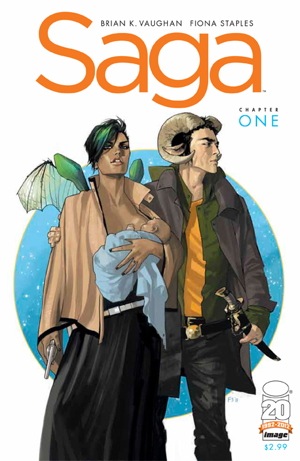
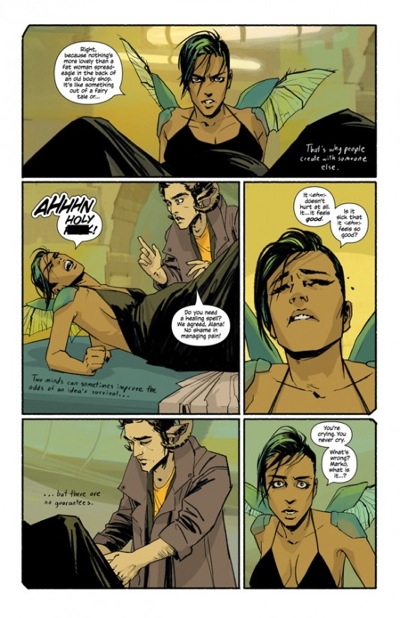
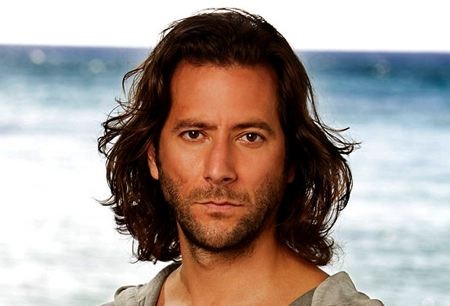
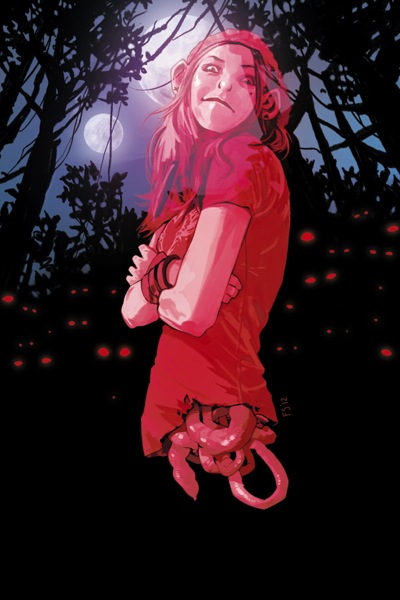
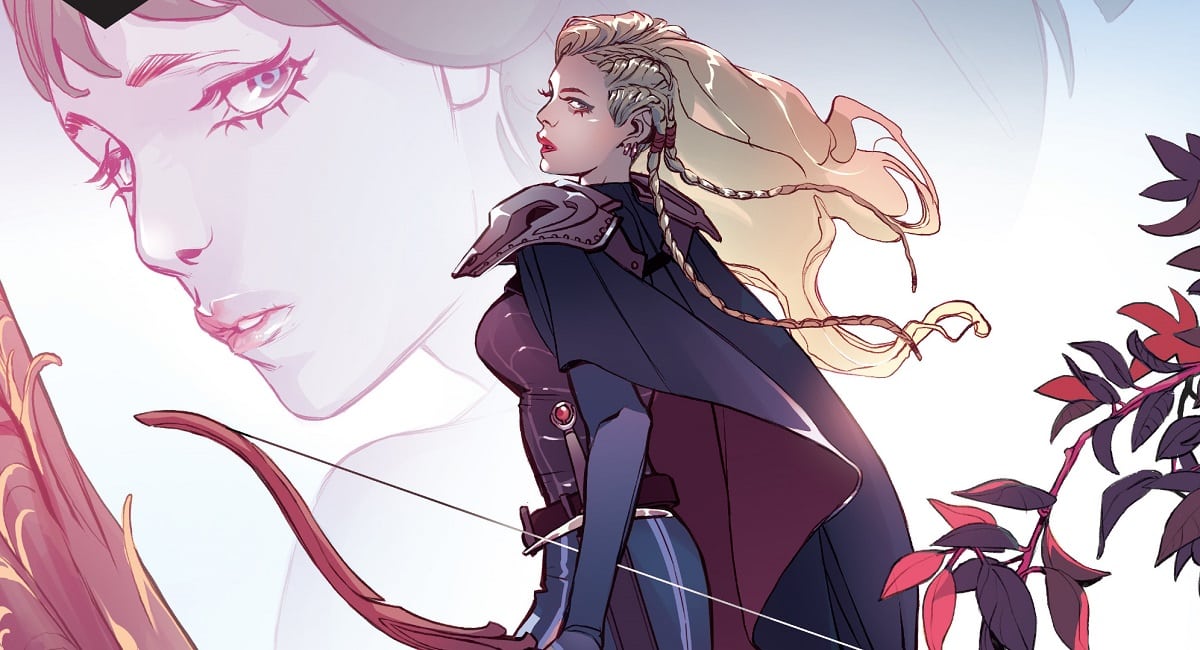
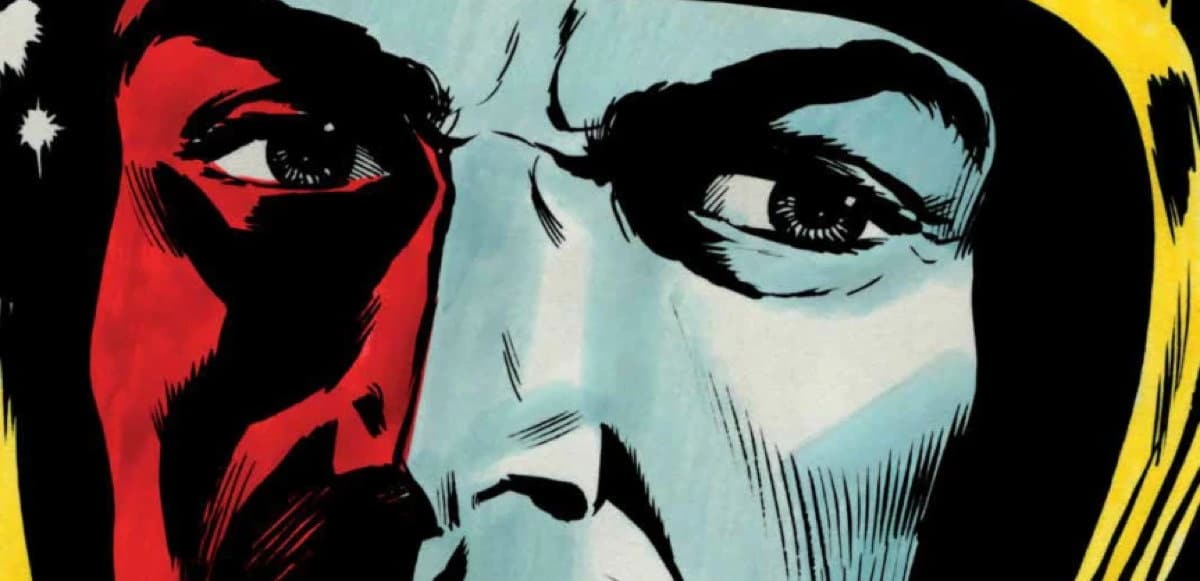




Great timing for a new interview. Always excited for BKV’s writing.
I have always enjoyed Brian’s work – but you would think that with all his success in both comics and other media that his name would be bigger on the cover. I know this is the standard for comics, but it drives me crazy that there isn’t more of an effort to promote talent and build name recognition. Now I know those in the industry will say – “But he is a big name!” and that is true in comic shops. But comic book publishers need to follow the path of how prose publishers make their authors into brand names. Consumers in the book market need to start buying books more based on the talent. Again, yes I know there are exceptions, Neil Gaiman, Frank Miller etc., but it is not the norm. Not even Alan Moore is given this treatment – just look at his latest hardcover Neonomicon, his name is tiny on the cover. Hell it’s even tiny on the Watchmen cover.
“It is only for the grown-ups with severed heads and boobies.”
–need not look any further for the front cover blurb for the trade collection!
BKV is a solid guy…these are the captains of industry we need right now pushing new ideas.
As ‘Before Watchmen’ epitomizes the lack of originality and the pursuit of the quick buck, I am so glad to see Image pushing creator owned projects with talent like Brian and Jonathan Hickman.
Great interview!
“BKV: And digital…I have no idea, I’m an old man. Digital frightens and confuses me. I don’t know what to expect…”
Digital means after reading this interview and reminding me that Saga came out today, with a few clicks I just bought the first issue and was able to start reading. I loved it and will definitely be picking this up as a trade from my local comic book store once it’s out. :)
I’d really like to corner BKV at a convention and ask him about Ex Machina.